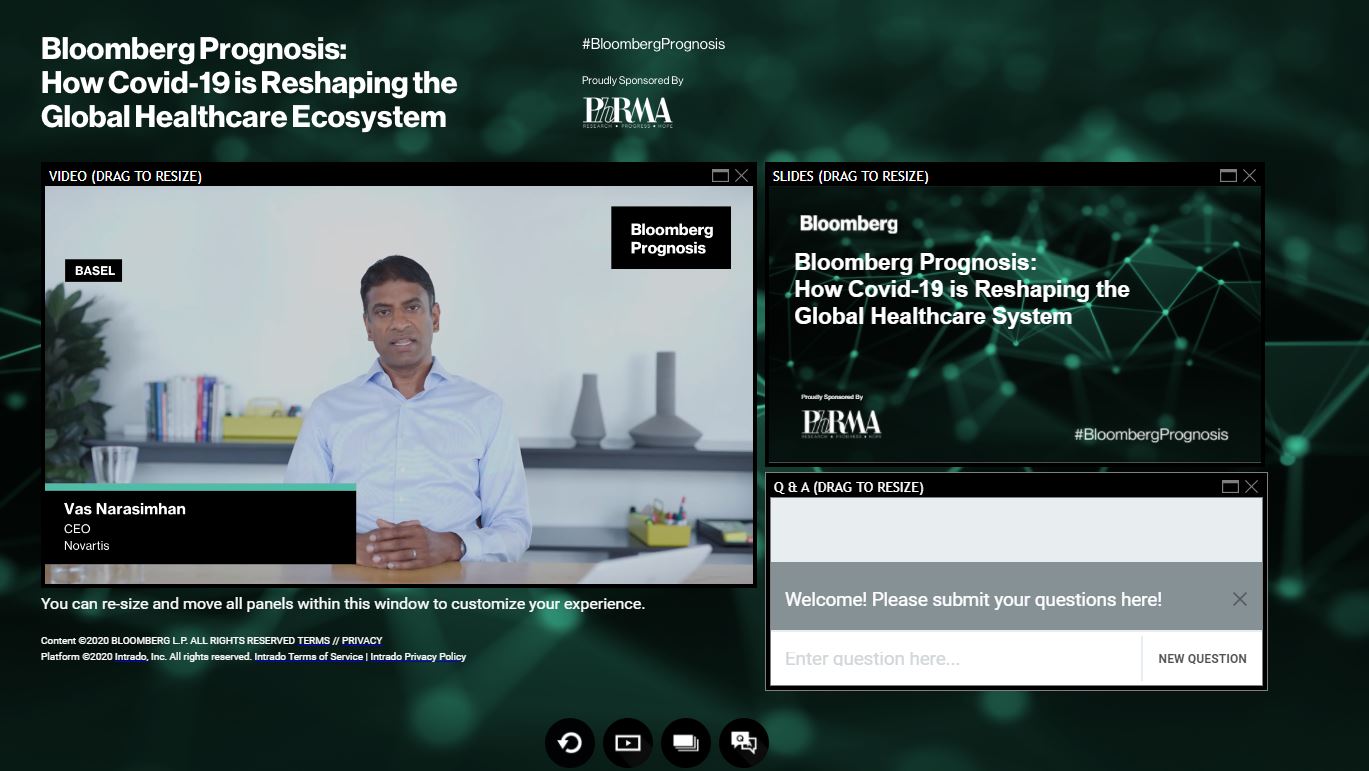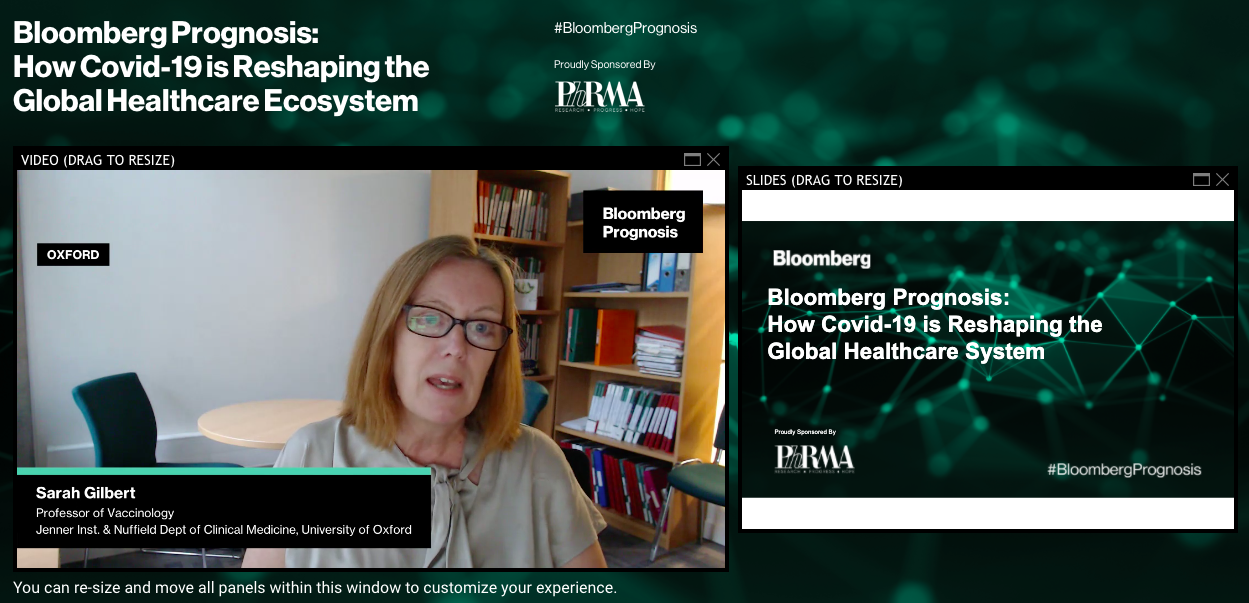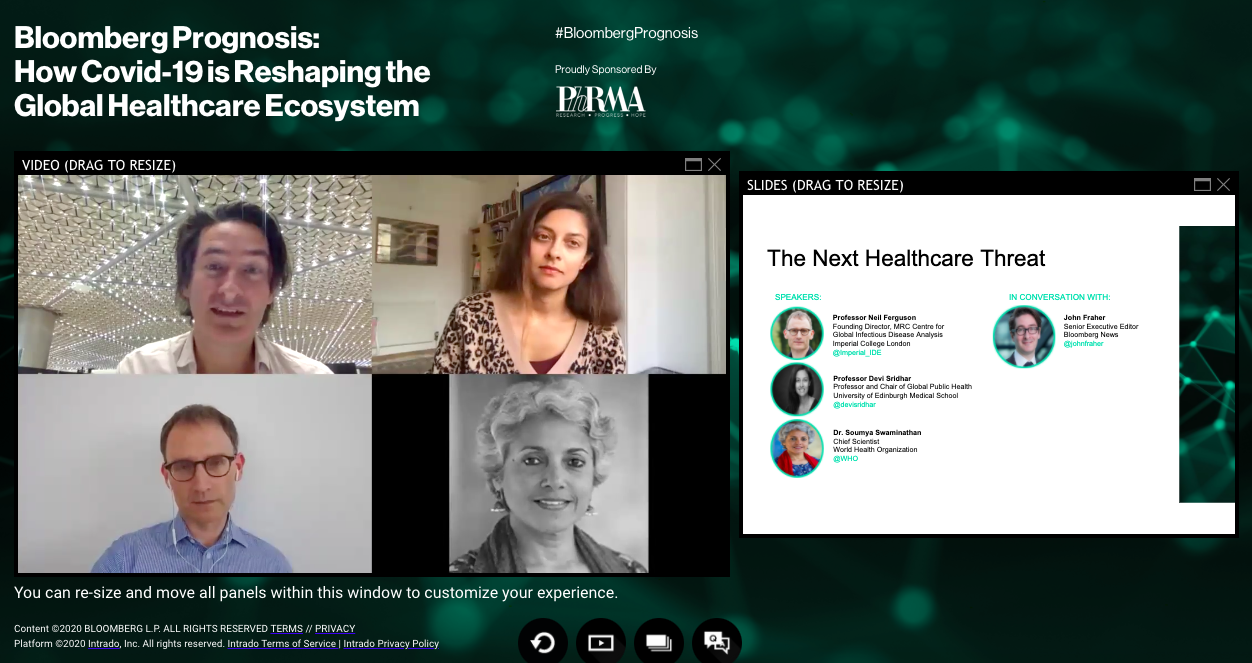
Bloomberg Prognosis: How Covid-19 is Re-shaping the Global Healthcare Ecosystem
By Jenny McCall, Bloomberg Live
At the Bloomberg Prognosis August 13th inaugural event, How Covid-19 is Reshaping the Global Healthcare Ecosystem, which was led off by Bloomberg Television anchor Francine Lacqua, key voices and leaders within the world of health care spoke to several of the issues associated with the ongoing pandemic. Speakers included:
- Seth Berkley, CEO, Gavi, The Vaccine Alliance
- Neil Ferguson, Founding Director, MRC Centre for Global Infectious Disease Analysis, Imperial College London
- Sarah Gilbert, Professor, Oxford University
- Kathrin Jansen, Senior Vice President and Head of Vaccine Research and Development (VRD), Pfizer Inc.
- Vas Narasimhan, Chief Executive Officer, Novartis
- Devi Sridhar, Founding Director, Global Health Governance Programme, Professor, University of Edinburgh Medical School
- Soumya Swaminathan, Chief Scientist, World Health Organization
- Francine Lacqua, Anchor, Bloomberg Television
- Sam Fazeli, Director of Research, Bloomberg Intelligence, Bloomberg
- Stephanie Baker, Senior Writer, Bloomberg News and Bloomberg Businessweek
- John Fraher, Senior Executive Editor, Bloomberg
Click here to view video of the full discussion.

A few of the key takeaways:
Vas Narasimhan, chief executive officer, Novartis said, “I think what’s realistic to expect is that with a combination of drugs and vaccines we can get to a stable place where the pandemic is manageable.” He called the actual elimination of the virus “unlikely.” Narasimhan said that he expects to see one or more vaccines available for vulnerable populations and front-line health care professions in early 2021. But he doesn’t expect broad use and availability of vaccines until late 2021. In terms of efficacy and safety of the various vaccine candidates, “We won’t know until we follow patients in clinical trials, in particular the vaccine trials, for six months to a year,” he said. “The longer you wait, the more knowledge you’re going to have on the vaccine.”
Sarah Gilbert, a professor at Oxford University, has led development of a vaccine that is a leading candidate. She said the vaccine s being tested in the United Kingdom in a 10,000-person trial that has signed up most of its participants. It’s set to run for as long as a year — gathering results, potentially with an earlier look. “We don’t yet have clarity on the timelines for those trials,” Gilbert said. She warned against early looks into the trial — a process called unblinding — that can taint the results. “We can’t have multiple looks at the data,” she said.
Kathrin Jansen, Pfizer’s head of vaccine research and development and a senior vice president, was also cautious when it came to an early look at the data. “We won’t unblind the study too early,” Jansen said. “If we are successful, yeah, we can declare success early.” Jansen added that with vaccines, which are given to healthy people, longer sets of data are crucial to find out how safe they are in the long term and how long protection lasts.

Dr. Seth Berkley, CEO, Gavi, The Vaccine Alliance, said that Gavi was set up to make sure that vaccines get out to the developing world. They have immunized close to a billion people with other vaccines. So when Covid-19 emerged, realized that there was a risk of a repeat of what happened in 2009 with the swine flu — where wealthier countries bought up doses and other countries could not get any. So they set up the COVAX facility to help prevent this. “We are aiming to have 12 -15 vaccines in the portfolio. The Gates Foundation is also bringing vaccines to the table and we are open for business for anyone who has a vaccine,” Berkley said.
Devi Sridhar, founding director Global Health Governance Programme and chair of the global public health department at the University of Edinburgh, said that over the past decade there have been an increasing number of viruses and bacterial infections spilling over into humans. “As long as we have close contact between animals and humans we will continue to have spillover events. And we’re seeing that through urbanization, deforestation and having wet markets,” Sridhar added.

Neil Ferguson, founding director, MRC Centre for Global Infectious Disease Analysis, Imperial College London, who advised the U.K. government on its early-stage response, said pandemics such as Covid-19 are rare, occurring perhaps as infrequently as once in 200 years. Yet more new viruses and outbreaks are likely to appear as urbanization and deforestation bring humans and animals into closer contact. “There are steps that can be taken to reduce the risks of future pandemics, mainly involving the reduction of human interaction with wildlife,” Ferguson said, adding that one of the big risks is killing game for food, along with sales in markets in Asia and Africa.
“We know this virus is not going away any time soon. It’s established itself and is going to keep on transmitting wherever it’s able to do so,” said Dr. Soumya Swaminathan, chief scientist for the World Health Organization. We know we have to live with this.” While hundreds of vaccines are in development that could slow or even halt the coronavirus, that’s just one step along the way to protection, she said.
Covid-19 has wreaked havoc in rich and poor countries alike, suggesting that public health systems have been lacking even in countries previously thought to have had strong systems of care, Swaminathan said. The U.S. currently has one of the world’s worst ongoing outbreaks. “We haven’t invested in public health responses [generally],” said Swaminathan. “The countries that have really responded well have done so because the political leadership took it seriously, took early note of what was happening, and relied on scientific expertise.”
——————————
Join the Conversation: #BloombergEquality
Instagram: @BloombergLive
LinkedIn: Bloomberg Live
Twitter: @BloombergLive
Interested in more Bloomberg Live virtual events? Sign up here to get alerts.
——————————
